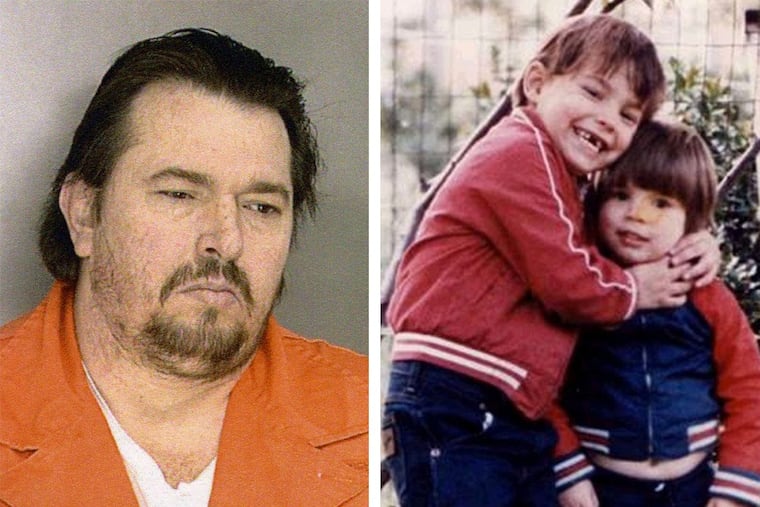Daniel Dougherty awarded 3rd trial in 1985 arson deaths of sons
Supporters have long maintained that key testimony from a fire investigator was based on techniques that were out of date and have since been discarded.

Daniel Dougherty, locked up these last 18 years, has always insisted he did not set the fire that killed his two young sons in their Philadelphia home in 1985.
Now, Pennsylvania Superior Court is granting him another chance to convince a jury – a third chance, after what appellate courts have deemed to be two unfair trials.
Supporters have long maintained that key testimony from a fire investigator was based on out-of-date and discarded methods of determining arson.
Dougherty, 57, was convicted for the second time last year. But on Tuesday, a three-judge panel of Superior Court ruled that he should get a new trial, citing several failings of the Common Pleas Court trial judge, who allowed:
The introduction of previous testimony by a city fire investigator who was unable to testify at the 2016 retrial, which Superior Court said violated Dougherty's right to face his accusers.
The introduction of a graphic photograph of the two children, pictured dead on a bed, which was inflaming but added "no additional evidentiary value to the jury."
The allowance of testimony that Dougherty was a drunk who hit women, when that behavior was not tied to the homicide and arson charges against him.
"We're certainly pleased and gratified that the Superior Court righted the errors committed by this trial judge," said defense counsel David Fryman, who has worked years with co-counsel Shannon Farmer to free Dougherty. "We're hopeful the District Attorney's Office will finally put an end to the pursuit of a case that never should have been brought in the first place."
Fryman said Dougherty, imprisoned at the Greene correctional institution, was told of the ruling. "He's pleased," Fryman said, "but continues to be frustrated that he's now in his 18th year behind bars and yet to get a fair trial."
The District Attorney's Office can appeal the decision to the full Superior Court, and potentially to the state Supreme Court. Spokesperson Cameron Kline said Tuesday that the office was reviewing the ruling and had not determined whether to appeal.
Dougherty has insisted he is innocent since the first hours after the fire, when he freely agreed to answer investigators' questions. He has always said he loved his sons and tried to save them that night. The fire destroyed the Oxford Circle rowhouse where Dougherty lived with his girlfriend, her young son, and his two boys.
He was not charged until 14 years later, and in 2000 he was tried, convicted, and sentenced to death for killing 3-year-old John and 4-year-old Daniel Jr.
His death sentence was reduced to life in prison in 2012 because of the ineffectiveness of his trial lawyer. In 2014, an appeals court ordered a new trial, saying his original lawyer's failings were so serious that no reliable determination of guilt or innocence occurred.
Those faults centered on the defense failure to challenge the fire science against Dougherty. In the retrial last year, the defense produced nationally known expert John Lentini, head of Scientific Fire Analysis LLC in Florida.
Lentini said that the rowhouse was so badly damaged that it was impossible to determine the cause of the fire and that "undetermined" should have been the classification.
It could have been arson, Lentini said on the stand. But it also could have been a cigarette, dropped and smoldering in a household of smokers.
Prosecutors attacked Lentini as unreliable, a consultant who would "whore himself and say anything" in exchange for a consultant's fee. They introduced the 1985 findings of Assistant Fire Marshal John Quinn, which were supported by consultant and former Fire Marshal Thomas Schneiders. After reviewing the case file, he testified that burn patterns definitively showed the fire was set in three places — a sofa, a love seat, and under a dining room table.
The defense argued that that was wrong. The case was closely watched by legal experts who say the use of outdated fire science has put innocent people in jail, that what was once seen as proof of arson is now known to be proof of nothing.
Dougherty was convicted after a 15-day trial, including seven days of deliberations during which one juror was replaced after becoming emotionally unable to go on.
Upon Dougherty's conviction, Assistant District Attorney Jude Conroy asked the judge to immediately sentence Dougherty to two consecutive life terms. Common Pleas Court Judge J. Scott O'Keefe agreed, adding a concurrent 10- to 20-year penalty for arson. "I haven't seen this despicable of a crime in a long time," O'Keefe said.